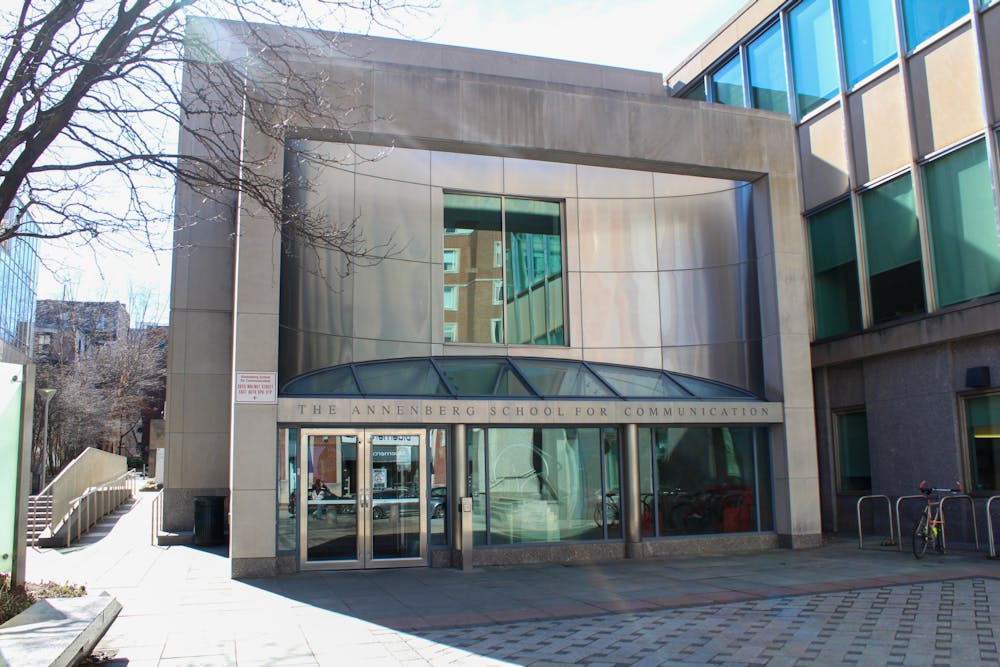
The Annenberg School of Communication launched a new podcast series, “Annenberg Conversations,” to explore recent and significant issues in the field of communication studies.
The podcast is hosted by Annenberg School Dean Sarah Banet-Weiser and features Penn scholars who specialize in different communication topics. The podcast, which is available on the school website and Spotify, released its inaugural episode on Oct. 21.
“One of the things I’m trying to do, as I ask different faculty members here at Annenberg to have these conversations, is to find people who approach a similar topic but from really different vantage points, who can learn from each other,” Banet-Weiser told The Daily Pennsylvanian.
The first episode, titled “Unpacking Election Politics,” explored the different ways that groups communicate during election season and how such conversations impact political trends. Banet-Weiser was joined by Annenberg School professors Sarah Jackson and Yphtach Lelkes for a 30-minute conversation exploring a wide range of topics, including political polarization, how activists influence politics, the spread of misinformation, and the use of social media as a political tool.
Banet-Weiser described the conversation as “generative,” noting unique perspectives from Jackson on the Uncommitted Movement and a fresh take from Lelkes on the intersection of gender and political polarization.
Another trend the professors discussed in the first episode was how social media is used by young Democrats to undermine the conservative identity. Jackson noted how users on social media platforms remixed racist comments made by President-elect and 1968 Wharton graduate Donald Trump during the recent presidential debate.
“This trend doesn’t undermine how serious the impact of some of this information can be,” Jackson said. “But I do think it’s interesting to see how ordinary folks who otherwise wouldn’t be engaged in thinking about propaganda or disinformation are taking it up in these playful ways that undermine it.”
In their conversation, Jackson, Lelkes, and Banet-Weiser also challenged commonly held beliefs, questioning whether political polarization is an inherently negative force and the extent to which misinformation can change voters’ minds.
Post-election, Jackson and Lelkes reflected on how communication played a role in Trump’s win.
Jackson told the DP that historically, younger generations tend to vote Democratic. However, she said that right-wing politicians adopted new approaches to communicate with their voter base that caused this demographic to shift in the recent election.
“I had an inkling that Trump’s approach to alternative media was to reach out to this group of people … who tend to be alienated from politics,” Lelkes said. “Going on podcasts, talking to young men who either don’t vote or traditionally vote left — these people seemed to be integral to Trump’s win.”
Election politics is one of many ways that communication studies are interwoven with current events. In the future, the podcast will tackle issues such as feminism on TikTok and understandings of climate change.
A second episode centered around “care and community” is in the works, according to Banet-Weiser. It will feature a conversation between School of Social Policy & Practice professor Desmond Patton and Annenberg School assistant professor Julia Ticona.
“I’m really committed to renewing our commitments to care and compassion and collaboration,” Banet-Weiser said. “And to thinking about how all of us at Penn and at Annenberg are a particular kind of community.”
The Daily Pennsylvanian is an independent, student-run newspaper. Please consider making a donation to support the coverage that shapes the University. Your generosity ensures a future of strong journalism at Penn.
Donate






